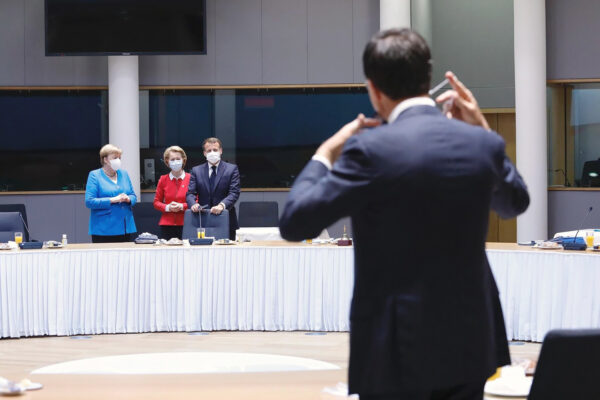
Emmanuel Macron and Mark Rutte belong to the same European liberal family, but they take different views on the future of the liberal world order.
The French president believes Europe should become less reliant on the United States and foreign trade. He argues for “strategic autonomy” in everything from the digital economy to defense to environmental policy.
The Dutch prime minister has doubts, rooted in decades of Dutch Atlanticism and centuries of overseas trade.
Both have allies.
Macron has the support of German chancellor Angela Merkel and European Commission president Ursula von der Leyen, a former German defense minister.
Rutte is backed by smaller countries in Central and Northern Europe as well others in the European Commission. The Financial Times reports that plenty suspect “strategic autonomy” is a fancy way to dress up French protectionism; are wary of formally endorsing the principle if it means undermining NATO and open trade; and are skeptical of the push for reshoring of industry and supply chains.
They have reason to be.
Military self-reliance
Military self-reliance is the less controversial of French ambitions, but it is also the one where Germany’s support rings hollow.
Merkel has said, “It is no longer the case that the United States will simply just protect us.” President Donald Trump has consistently sided against European interests and called NATO “obsolete”. If Joe Biden wins in November, he will likely resume Barack Obama’s “pivot” to Asia.
Igor Dordevic has argued that a common defense would allow Europe to focus on its own geopolitical challenges, in Eastern Europe, the Eastern Mediterranean and North Africa, rather than America’s.
The Dutch-led “frugals” and free traders aren’t the problem. The Netherlands and other small countries have been willing to give up military independence for the sake of a European defense. Belgium and the Netherlands jointly procure frigates and minesweepers. The Benelux countries have integrated their air defenses. The largest ship in the Dutch navy, HNLMS Karel Doorman, is shared with Germany. Dutch and German panzer divisions are being merged. The Baltic states, Denmark, the Netherlands, Norway and the United Kingdom have formed a joint expeditionary force. Finland and Sweden share military bases.
25 out of 27 member states — excluding Denmark and Malta — have committed to enhance military interoperability, pool defense procurement, avoid competition between European defense contractors and improve military logistics under the so-called Permanent Structured Cooperation (PESCO).
The European Commission has proposed creating an EU-wide procurement fund as well as a Directorate General for Defense Industry and Space to manage it.
States close to Russia, notably Poland and Romania, are wary of weakening transatlantic ties, but the real obstacle to a European army is German foot-dragging. Merkel claims to support Macron’s ambitions but has done little to make them a reality. The German army is barely combat-ready. German defense spending is rising, but it still doesn’t meet the 2 percent of GDP recommended by NATO.
The latest Franco-German paper on military cooperation calls for a threat assessment by the end of the year, based on which the EU would decide how to enhance its joint capabilities in such areas as cyber security and peacekeeping.
That is what Americans call kicking the can down the road.
Unless and until the continent’s largest economy commits wholeheartedly to defense union in Europe, it will remain half-baked.
Economic autonomy
France and Germany are aligned on economic autonomy. They have called for massive European investments in innovation, relaxing European competition rules to allow state aid and big mergers, keeping out unwanted foreign investment and insisting on reciprocity in public contracts.
In addition, Macron argues for adopting European preference in public procurement and punishing foreign companies that don’t respect EU data-protection and environmental regulations.
The Franco-German proposals came after the European Commission blocked a merger of the French and German train manufacturers Alstom and Siemens.
Which gives the smaller countries pause. They worry that a “European industrial policy” will be a smokescreen for supporting French and German multinationals.
As I wrote last year:
The French and Germans fear being crowded out by American and Chinese behemoths; their neighbors fear being crowded out by Franco-German monopolies.
European self-reliance in raw materials could lead to “tens of billions in subsidies to compete with China,” one diplomat tells the Financial Times — “and we aren’t going to do that.”
Rutte and his allies have their own ideas, which run in the opposite direction:
- Completing the single market in services.
- Removing barriers to labor mobility, including through mutual recognition of professional qualifications.
- Setting global standards in artificial intelligence and the digital economy.
- Incentivizing cross-border private risk-sharing and risk diversification.
- Improving enforcement of existing market rules.
The European Commission, which is responsible for fair competition in the European single market, and keen to take up the mantle of globalization from the United States, ought to block proposals that reek of protectionism. Whether it does may determine if Macron’s or Rutte’s vision of the EU prevails.
